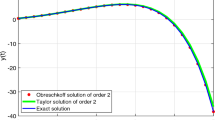Abstract
The numerical solution of initial value problems for ordinary differential equations is frequently performed by means of adaptive algorithms with user-input tolerance τ. The time-step is then chosen according to an estimate, based on small time-step heuristics, designed to try and ensure that an approximation to the local error commited is bounded by τ. A question of natural interest is to determine how the global error behaves with respect to the tolerance τ. This has obvious practical interest and also leads to an interesting problem in mathematical analysis. The primary difficulties arising in the analysis are that: (i) the time-step selection mechanisms used in practice are discontinuous as functions of the specified data; (ii) the small time-step heuristics underlying the control of the local error can break down in some cases. In this paper an analysis is presented which incorporates these two difficulties.
For a mathematical model of an error per unit step or error per step adaptive Runge–Kutta algorithm, it may be shown that in a certain probabilistic sense, with respect to a measure on the space of initial data, the small time-step heuristics are valid with probability one, leading to a probabilistic convergence result for the global error as τ→0. The probabilistic approach is only valid in dimension m>1 this observation is consistent with recent analysis concerning the existence of spurious steady solutions of software codes which highlights the difference between the cases m=1 and m>1. The breakdown of the small time-step heuristics can be circumvented by making minor modifications to the algorithm, leading to a deterministic convergence proof for the global error of such algorithms as τ→0. An underlying theory is developed and the deterministic and probabilistic convergence results proved as particular applications of this theory.
Similar content being viewed by others
References
M. A. Aves, D. F. Griffiths and D. J. Higham, Does error control suppress spuriosity?, to appear in SIAM J. Num. Anal.
J. C. Butcher, The Numerical Analysis of Ordinary Differential Equations (Wiley, New York, 1992).
M. Calvo, D. J. Higham, J. I. Montijano and L. Randez, Stepsize selection for tolerance proportionality in explicit Runge-Kutta codes, Advances in Computational Mathematics, to appear.
J. W. Demmel, On condition numbers and the distance to the nearest ill-posed problem, Num. Math. 51 (1987) 251–289.
A. Edelman, On the Distribution of a scaled condition number, Math. Comp. 58 (1992) 185–190.
G. Hall, Equilibrium states of Runge-Kutta schemes, ACM Trans. on Math. Software 11 (1985) 289–301.
D. J. Higham, Global error versus tolerance for explicit Runge-Kutta methods, IMA J. Numer. Anal. 11 (1991) 457–480
R. Schrieber and L. N. Trefethen, Average-case stability of gaussian elimination, SIAM J. Matrix Anal. 11 (1990) 335–360.
L. F. Shampine, Tolerance proportionality in ODE codes, in: Numerical Methods for Ordinary Differential Equations (Proceedings), eds. A. Bellen, C. Gear and E. Russo, Lecture Notes in Mathematics 1386 (Springer, Berlin, 1987) pp. 118–136.
S. Smale, The fundamental theorem of algebra and complexity theory, Bull. Amer. Math. Soc. 4 (1981) 1–35.
H. J. Stetter, Considerations concerning s theory for ODE-solvers, in: Numerical Treatment of Differential Equations, eds. R. Burlisch, R. Grigorieff and J. Schröder, Lecture Notes in Mathematics 631 (Springer, Berlin, 1976).
H. J. Stetter, Tolerance proportionality in ODE-codes, in: Proc. Second Conf. on Numerical Treatment of Ordinary Differential Equations, ed. R. März, Seminarberichte 32, Humboldt University, Berlin (1980).
D. Stoffer and K. Nipp, Invariant curves for variable step-size integrators, BIT 31 (1991) 169–180 and BIT 32 (1992) 367–368.
A. M. Stuart and A. R. Humphries, Dynamical Systems and Numerical Analysis (Cambridge Univ. Press, 1996).
M.-C. Yeung and T. F. Chan, Probabilistic analysis of Gaussian elimination without pivoting, Preprint, UCLA (1995).
Author information
Authors and Affiliations
Rights and permissions
About this article
Cite this article
Stuart, A.M. Probabilistic and deterministic convergence proofs for software for initial value problems. Numerical Algorithms 14, 227–260 (1997). https://doi.org/10.1023/A:1019169114976
Issue Date:
DOI: https://doi.org/10.1023/A:1019169114976



